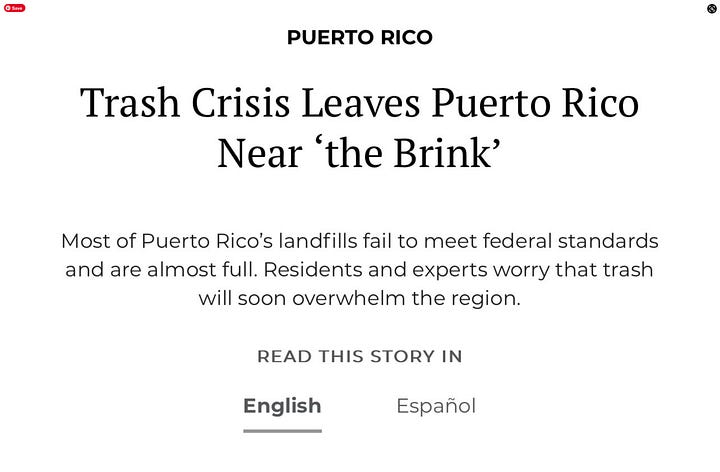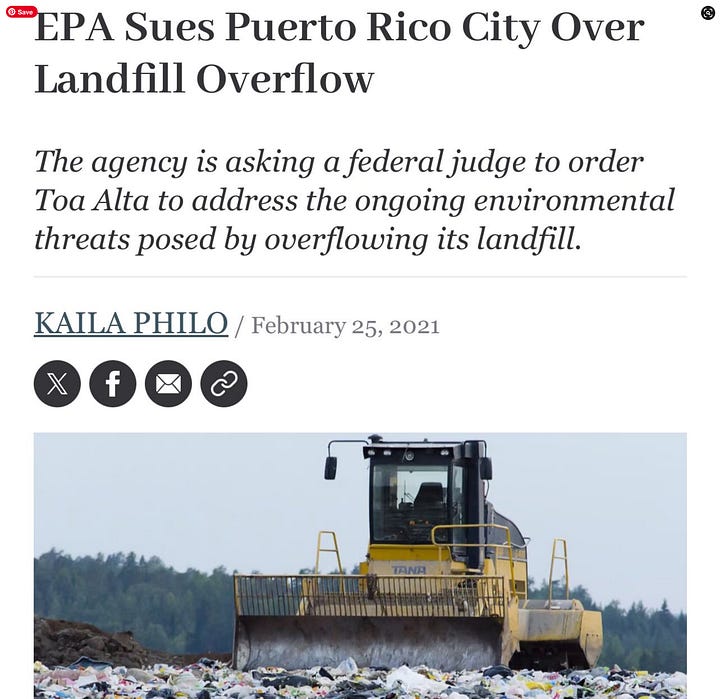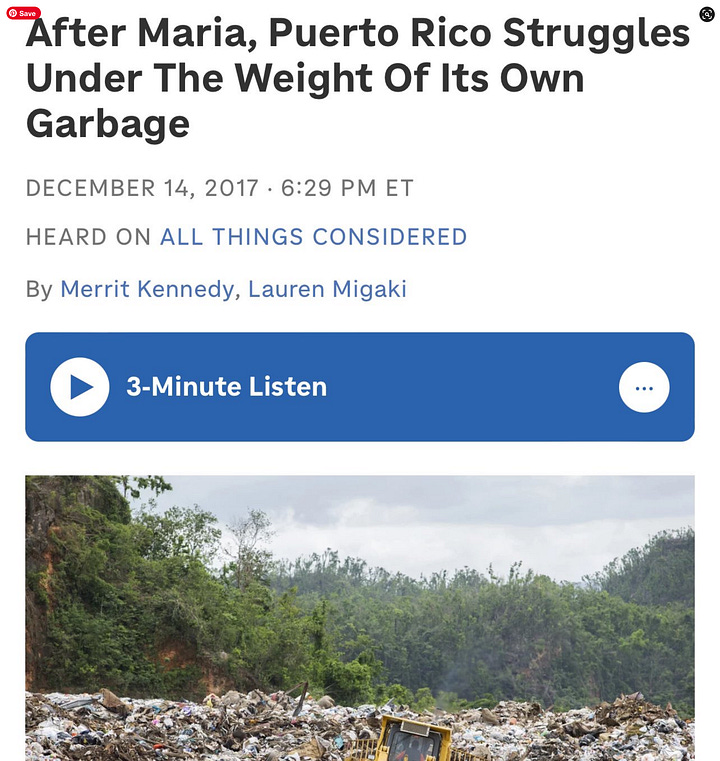Are Politics Ruining Your Relationship?
My Response to MSNCB's Joy Reid, Resisting the Peter Pan Syndrome, Healthy Independence in Trans-identified Kids and Parenting Through Oppositional-Defiant Disorder
There are almost 4000 of you who read this monthly newsletter because you want thoughtful and nuanced reflections about parenting gender-questioning adolescents.
I will continue making this writing available for free, and paying subscribers really help me to do this -- as of now, only 1.2% of you are paying supporters. If you can, join the paid tier to support my work here. If you can't, then please like, share and comment.
What’s on my mind…
You can either watch or read this section. The video is embedded below, followed by a text version.
Are Politics Destroying Your Relationships?
In the wake of any presidential election, we can expect disappointment in people whose candidate didn’t win. Disagreements over politics are nothing new in most families and friendships, however, I’ve been deeply troubled by some of the conversations happening in the last few weeks which encourage disdain and estrangement from one’s own family because of how they voted. Today we’re going to look at one MSNBC clip and analyze the advice of a Yale psychiatrist, Dr. Amanda Calhoun, who was featured on the program, The ReidOut. Joy Reid, the host of this show asks:
The challenge with the idea of — how do you interact with people who you know voted for this, right? If you are an LBGTQ person and you know someone in your family voted essentially against your rights, or you’re a woman and you know this man was calling people “the B word.” JD Vance was literally calling Kamala Harris “the trash” and said, “were gonna take out the trash.” I know a lot of black women were incredibly triggered by that, and then if you meet somebody and you know they voted for the people who called you trash, or if you’re Puerto Rican and you know someone voted that way, do you recommend, just from a psychological standpoint, being around them? We have the holidays coming up.
There’s already a lot to unpack. Before we even get to Joy Reid’s question, did you notice the ticker on the bottom of the screen? It highlights “crisis calls” from LGBTQ+ youth increasing by 700% after the election. That’s a staggering number if it’s accurate. Let’s set aside for a moment the difficulty of verifying this statement, verifying who exactly is calling into the crisis hotlines, and what their call has to do with the election. Not to mention the lumping in of every possible sexual orientation, political identity, and gender-questioning experience into one label: LGBTQ youth. All that aside, if young people are genuinely terrified and in “crisis” perhaps the best way to help de-escalate them is to provide grounded, reasonable advice. For example, your feelings are real, but sometimes they can lead us astray. Or we can encourage young people not to catastrophize and check their cognitive distortions against reality. MSNBC claims to be advocates for LGBT youth. Have they done anything to de-escalate them or help calm their nerves? Unfortunately, not. In fact, they’ve consistently done the very opposite. Calling every single policy proposal or discussion about women’s issues, gender medicine, or trans issues “anti-trans” or “dangerous” isn’t helping here. See examples below.



Joy’s question is fueling the fire. She’s not giving the benefit of the doubt to people who voted differently. She’s not encouraging understanding or compassion in family relationships. Her question is intended to arouse suspicion and get people angry. Think about it: Of course, in isolation, those comments, words, and jokes she mentioned are definitely insulting and crass. But there’s a lot of context missing. Just 9 days before this aired, Joe Biden actually called Trump supporters "garbage.” And regarding the joke about Puerto Rico, comedian Tony Hinchcliffe said “there’s literally a floating island of garbage in the middle of the ocean right now. Yeah, I think it’s called Puerto Rico”.
On the surface, this joke looks like it’s directly motivated by racism or hatred of Puerto Ricans. However, the media has been reporting for the last 6 or 7 years that the island of Puerto Rico has been struggling with a legitimate and well-documented waste management crisis (see images below). I suspect Hinchcliffe knew precisely that people would not have that context and knew precisely how this joke would be interpreted and reported on hysterically. In fact my first reaction to hearing the joke was also horror and disbelief. However, upon learning the context, it became impossible to claim this is a hateful joke targeting individual Puerto Rican people because they’re Puerto Rican.




What’s important here is that Joy pulled out the most controversial and egregious things said during the political campaign and then asks whether Calhoun recommends, “from a psychological standpoint, being around them?”
Calhoun responds:
So I love that you asked this question because, you know, there is a push (I think this is a societal norm) that if someone is your family that they are entitled to our time. And I think the answer is: absolutely not.
Unequivocally, the quality of our relationships is one of the most important things we should focus on if we want to live good lives, free from mental health issues, loneliness, and despair.
Nobody in the world will care about you, love you, or support you like family in the vast majority of cases.
And specifically, the relationship between parents and their kids is of utmost importance. Only the most dire of circumstances should justify breaking the fundamental bond between parents and children.
In that single statement, that “your family is absolutely not entitled to your time”—Dr. Calhoun undermines the exact kind of behavior that keeps a relationship intact: spending time together, being generous in how we interpret people’s behavior and accepting some frustrating things about each other that we may not agree upon.
Calhoun continues:
So if you are going to a situation where you have family members, where you have close friends, who you know have voted in ways that are against you, like what you said, against your livelihood, then it’s completely fine to not be around those people and to tell them why, you know, to say, “I have a problem with the way that you voted because it went against my very livelihood and I’m not gonna be around you this holiday and I need to take some space for me.”
I suspect she is using livelihood incorrectly here. An example of a “vote going against one’s livelihood” would be a minimum-wage worker who doesn’t like that his uncle voted for politicians who want to further lower the minimum wage. Arguably, that is a vote against the worker’s livelihood.
Nonetheless, taken at face value, I thought it was an interesting tactic for Calhoun to use. This is a politicians’ tactic more than a psychiatrist’s. For example, in politics, it’s common to hear “a vote for the other guy is a vote against the working class" or “a vote for the other guy is a vote against women,” etc.
This is political rhetoric. It’s strange rhetoric coming from a psychiatrist. Ideally, a psychiatrist’s job is to be emotionally balanced, clear-headed and thoughtful. Psychiatrists should avoid hyperbole and cognitive distortions. Psychiatrists should emphasize that emotions are real and important, but they can lead us astray and distort our perceptions. A thoughtful psychiatrist might ask, “What other motivations might have led your relative to vote that way?” or “Let’s examine the idea that your relative voted against you. What evidence do you have for and against this?” or “Are there other examples of your relative attempting to undermine your very livelihood?”
Authority figures are in positions of great responsibility and when they mislead people, it has serious consequences.
Another example of an authority figure, this time a police lieutenant, making unhinged claims about Kamala Harris voters is captured in this clip:
In this case, however, the deputy sherif came out immediately to condemn the officer and his strange Facebook posts. The sheriff reaffirmed the county’s mission to serve the entire community. Plus the original offending words were made via Facebook posts. The offending officer wasn’t given a massive platform on cable news to advise hundreds of thousands of viewers. After Dr. Calhoun advised cutting off family on MSNBC, I searched for any statements or corrections from Yale University. I found none.
A healthy society depends on healthy relationships. And healthy relationships require us to do at least the following:
give each other the benefit of the doubt
listen to each other actively without judgment
understand what our loved ones intended with their behavior
accept that we will have differences
I've been a therapist for over 16 years. In full disclosure, I went through my own period of hypervigilance around issues of sexism, racism, and many of the other “isms” which are frequently discussed in cultural debates. I do think these biases are real. I don’t think they're nearly as ubiquitous as media outlets suggest. And I don’t think the best way to deal with these biases is by cutting people off or severing our closest relationships.
Media messaging often encourages us to search for instances of offense and simultaneously tells us that being offended is intolerable. This is a recipe for paranoia, anxiety, and dysfunctional relationships.
As a therapist, I know that sometimes people are genuinely better off severing ties with particular relatives. But this is the exception, and not the rule. And it’s not appropriate to base those decisions solely on the relative’s voting preferences.
What is the benefit of encouraging people, en masse, to tear up their families like this? Why would you tell someone to pursue a moralistic adherence to political ideology over family ties?
Is the goal to build a like-minded “political family” in lieu of an actual family?
Sadly, many parents have become estranged from their children because of gender beliefs and other political ideologies. It’s precisely the emotionally vulnerable who are most at risk of taking action on Dr. Calhoun’s advice. It’s hard not to notice the similarities with extreme religious and political cults. Such groups almost always push members to sever ties with family or friends. Anyone who may challenge or contradict the group dogma is seen as a dangerous outsider. Forcing this type of estrangement is also common in abusive relationships and marriages.
Estrangement leaves family members feeling powerless, devastated, confused, and angry. If this is happening in your family, please consider seeking support from other survivors of estrangement. Email Jo@genspect.org to learn more about the parent group for estranged families.
On the other hand, I hope this pattern is not the norm. I suspect that many young people see through these destructive suggestions and understand the value of our closest connections, even when they may be strained. Our relationships deserve to be protected and cherished. With that spirit, let’s move into the holiday season with warmth and generosity for the important people in our lives.
What’s on my radar…
A few legal updates today:
When Missouri banned “gender affirming care” for minors, a lawsuit was brought on behalf of families with trans-identified youth, gender physicians and LGBTQ advocacy groups. A Missouri judge upheld the ban on Monday, November 25th, allowing the state to prohibit such treatments.
In a similar case, tomorrow the Supreme Court of the United States will hear the case over Tennessee’s ban of surgery, hormones, and puberty blockers for minors. Journalist Ben Ryan will be covering the story, as he’s been granted permission to attend oral arguments for this landmark case. You can follow him on X here and Substack here.
For more context on these cases and others, don’t miss our interview with attorney, Glenna Goldis on Gender: A Wider Lens, coming this Friday, December 6th.
What’s new in my Parent Membership Group on SubscribeStar…
Topic Video:
As I discussed recently, sometimes a trans identity seems driven by a conflicted relationship with growing up. These teenagers may be ambivalent about getting older, for a variety of reasons, and transition promises (falsely) to help them sidestep the responsibilities and requirements of adulthood in their natal sex. But even before they reach the teenage years, children are less independent and capable than previous generations of children. Why is that? And when gender issues are looming, is it better to hold kids back to keep them safe, or is it better to risk medicalization in order to give them age-appropriate autonomy? I answer these questions and lay out a scaffolding strategy to help kids break free from the gender obsession and move towards a heathy, capable adulthood.
Don’t forget that you can always view short clips of Topic Videos and other educational videos on my YouTube Channel.
November Live Q+A: Special Guest
My guest this month is a writer with a young adult daughter. She described her family’s remarkable and harrowing journey which began over 4 years ago with a trans identity that appeared during a very difficult time in her daughter’s life. This gifted but challenging girl went from from extreme oppositional-defiant disorder to traveling the world with self-sufficiency and purpose. And of course, she developed a more flexible and relaxed attitude towards gender identity along the way. My guest also explained that while she has a wonderful husband, she feels like a single parent when it comes to her daughter’s trans identity. This conversation was sincere and deeply relatable to everyone who attended.
To hear this conversation, you can join the Q+A tier of my Parent Membership Group here.
What’s in my headphones……
In the 14th installment of the Open Therapy Podcast series, Andrew Hartz and Leslie Elliot-Boyce explore Trans-Activism and the Control of Others. In this episode, Leslie (a life coach) and Andrew (a therapist) discuss the desire of activists to ensure access of trans-identifying men to women-only bathrooms, locker rooms, and other intimate areas, and the violence that frequently accompanies these demands. Leslie starts by telling Andrew what happened to her and her husband, Benjamin Boyce, when they tried to attended a panel about women’s rights at the Seattle Public Library. Trans activists physically assaulted them and tried to prevent attendees from getting into the event. This was a rich jump-off point for discussing the trans activist movement and its attempt to “kill thoughts and annihilate feelings”.
What’s on our podcast…
Last month’s episodes of Gender: A Wider Lens stirred up lots of conversation in the YouTube comments and across social media. Links and summaries are below so you can check out the episodes and join the discussions.
The Autogynephilia Controversy with Phil Illy This is a challenging and thought-provoking conversation on sexuality, identity, and self-understanding. Phil claims that 3 of 4 trans people have autoheterosexuality, but we aren’t so sure. We engage with Phil’s concept of auto-heterosexuality, explore his interpretation of "erotic target identity inversion," and examine how these theories relate to broader discussions around sexuality and identity. As the discussion evolves, we push back with our critiques and challenge Phil's framework, urging for a deeper understanding of these complex concepts.
How the Gender Agenda Captured Iceland, with Eldur Smári Kristinsson Eldur describes how over the last 25 years, Iceland has transitioned from a nation advancing progressive gay rights to one where gender ideology has infiltrated institutions, including government, education, and even the Church of Iceland. This change, Eldur argues, has been driven by ideological activists and well-funded interest groups seeking to perpetuate their influence. Eldur is a writer, free-thinker, and current chairman of the Lesbian and Gay Alliance in Iceland. He offers a revealing overview of Iceland’s rapid societal transformation into what he describes as a "gender-crazed dystopia”.
Frauds, Fetishes, and Frameworks in Today’s Trans Movement with Dr Az Hakeem We welcome back author, psychiatrist, and psychotherapist Dr. Az Hakeem to the show, sharing his experience and insights from his extensive career spanning over two decades in the field of gender dysphoria. He reflects how he initially recognized the growing confusion around the issue and noted that the real "madness" was not in the individuals struggling with gender identity, but in society's response to them.
In this episode, not only does he revisit his poignant and popular “goth mark-5” analysis as referenced in his previous appearance on Gender: A Wider Lens, but Dr. Hakeem also outlines his four distinct categories of individuals within the broad trans identity label, offering insights into their psychological and sociological distinctions based on his extensive clinical experience with gender dysphoric individuals. He emphasizes that understanding these distinctions is crucial for addressing the needs and motivations of each group more accurately.
Paving a Way Back for Detrans Lesbians with Aaron Kimberly We welcome Aaron Kimberly back to the show, nearly a year after her first appearance on the podcast. Aaron has undergone a remarkable transformation, returning to her female identity and embracing a new understanding and acceptance of herself. This episode delves into Aaron’s complex journey of self-discovery, shaped by her unique experiences with a rare ovotesticular disorder of sex development (DSD), her longstanding identity as a butch lesbian, and the medical, professional, and social experiences that have shaped her path.
I am available for one-on-one parent consultations. You can learn more about what these sessions entail, plus view my availability on my Substack.
Often I am booked quite far in advance, but if you are a Founding Member of this Substack, you will get priority booking.
In the meantime…
Here’s one thing to try…
Money Management Skills
Teach your child some money management skills!
Right now does your child have zero access to spending money? Does he or she simply ask you to purchase things for him/her? Maybe they actually use the family amazon account, simply adding items to the cart and checking out whenever they want. In either case, this is a great opportunity to teach them some budgeting skills. During your weekly errands, something as simple as checking out at the grocery store or Starbucks is something your teen can do. Give him or her your credit card and have your child interact with the cashier. Then, invite your child to sit down with you next time you’re looking at the family finances or paying bills. Help them to make the connection between purchases that were made in store or through the Amazon account, and teach them about paying bills, managing a budget, etc.
Many parents help to open a pre-paid credit card or debit card for their child, with a limited monthly allowance. This is another great way to learn about budgeting and saving. Once the monthly allowance runs out, that’s it.
You can also make a deal with your teen: “I’d like to start giving you a monthly allowance to spend from your very own credit card, but we need to open the card in your birth name.”
Before leaving high school, ensure your child is ready to manage some of their own finances. Perhaps you can turn over certain expenses and put them in your child’s name, like a cell phone bill, or Netflix subscription. Teach them about credit cards, interest, and encourage them to start budgeting for important things like a downpayment for a car or other purchases they’re excited about. Show them bills related to your home, utilities, water/trash, etc. They’ll need to understand how this works when they live on their own one day. Teach them about emergency savings and having a financial safety net. More detailed involvement with investment accounts and long-term financial planning can happen at this stage too.
Regarding entrepreneurship, if your teen creates things like digital art or crafts, you can help them set up an online shop on Etsy or other platforms. You might even look into local art festivals, getting a booth or finding ways your child can display or sell their creations.
*If all of this makes you nervous because you’re afraid that learning about money will give your child the chance to save up for medicalization, consider joining my parent group where I address this question in the November Essential Topics Video.






Did you see Tali and Aaron's response to the G:AWL interview with Dr. Az Hakeem?
https://www.youtube.com/watch?v=c3h-FZA-2iE
It was recommended by Prof. J. Michael Bailey.
I think it would be good if G:AWL could invite Prof. J. Michael Bailey back onto G:AWL, given so much has been said since his last interview.
I think there is disagreement that is not being heard when it comes to the cause of gender dysphoria amongst adolescent boys. Stella, Jo Burgo and Genspect are saying there are a new type of "ROGD boy", whereas I think it would be accurate to say that Prof. J. M. B. sees this as autogynephilia, and that there is a lack of understanding what autogynephilia is, e.g. in his response to Burgo:
"He doesn't understand autogynephilia. And although he may be a good therapist, psychoanalysis is a terrible scientific tool for understanding anything."
https://x.com/profjmb/status/1689585682392518656
Sorry to hijack your Substack. However since I was an "ROGD boy", I thought I would share some insight.
In your conversation with Phil, I think you questioned whether Phil's experience of wanting to be a woman in female company was similar to some universal experience, which everyone might feel.
But what Phil feels, autogynephilia, isn't a social construct, it's an odd paraphilia, which can't be understood in terms of something else.
Similarly, I don't really understand what it is like to have somebody else's sexuality e.g. I don't know why gay men find other men attractive.
I have written another article that attempts to illustrate autogynephilia here: https://transpolicy.substack.com/p/how-to-recognise-autogynephilia
Autogynephilia is an odd paraphilia, which occurs with certain other paraphilia. Not a social construct that can be understood in terms of some social theory like "shame" or "failing to live up to stereotypes". Prof. J. Michael Bailey for this reason is very correct in saying "AGP is baffling to most people. I have studied it for 25 years and don't really know how AGPs feel."
I continue to talk about autogynephilia, as really this whole "gender issue" should be very, very small. If you don't have autogynephilia, you should need to worry about this issue: the discussions about "gender identity" are causing the issue. The problem is, is that everyone keeps on covering up autogynephilia:
https://www.healthsense-uk.org/publications/newsletter/newsletter-128/434-128-letter.html